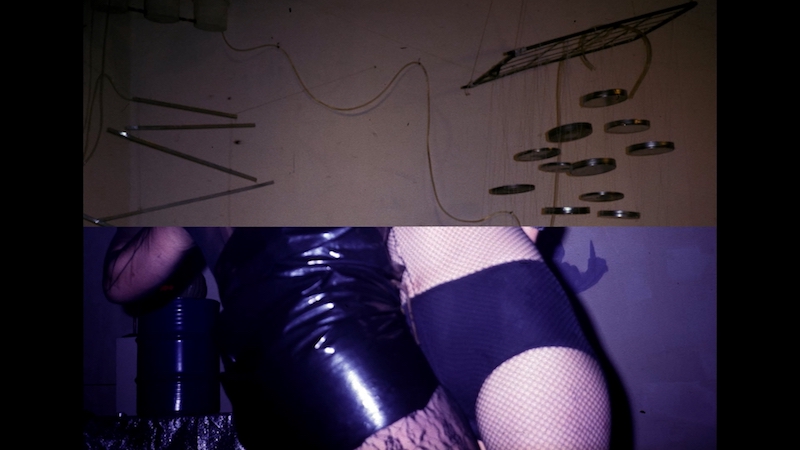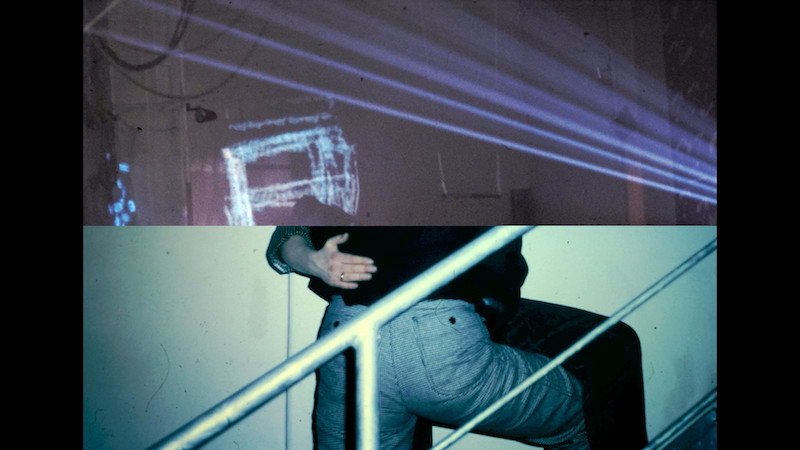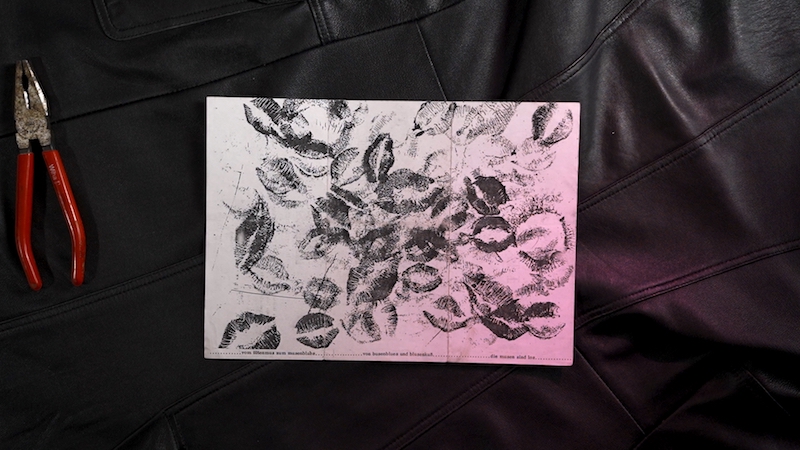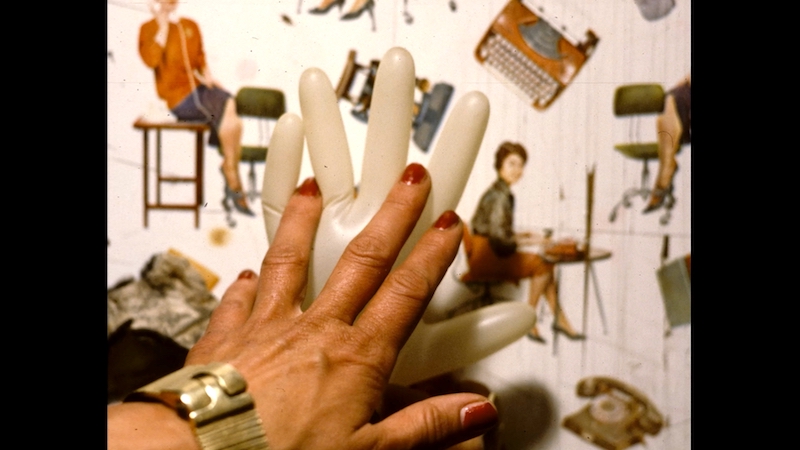Feb. 22, 2022
Operating between 1981 and 1996, Pelze Multimedia was a space for women* and lesbians* in an initially squatted building in Schöneberg, West Berlin. In their film ‘Subject Spaces’—now screening in the IBB Video Space at Berlinische Galerie—Katharina Voß and Janin Afken pay tribute to this venue and the way it fostered a community of free expression among lesbian artists and cultural producers at the time. We spoke to the filmmakers about why they chose to feature this space in their documentary, and how its existence paved the way for new queer scenes emerging in Berlin in the years since.

Katharina Voß/Janin Afken: ‘Subjekträume – eine lesbische Produktionskapsel. Pelze Multimedia Westberlin 1981–1996,’ 2020 // © Katharina Voß/Janin Afken
Berlin Art Link: Can you tell us about why you chose Pelze Multimedia as the center point of your film ‘Subject Spaces’? What was its significance to the West Berlin queer scene of the 1980s and 90s, and what is its significance today?
Janin Afken: As part of the European research project ‘Cruising the 1970s: Unearthing pre-HIV/AIDS Queer Sexual Cultures,’ where I worked, we were to make a film dealing with queer sexual cultures. Having previously researched the lesbian magazines Lesbenpresse and UkZ from the 1970s, I wanted to draw attention to contexts that functioned differently and also to new topics within lesbian* feminist queer groups of the early 1980s.
Katharina Voß: Pelze appeared in various conversations I had over many years in Berlin, as this in/famous, mysterious, intriguing space, something that caught my interest but then I forgot again, because I could hardly find any information anywhere. When Janin approached me with her desire to make a film related to her research, I was enthusiastic, because despite the current archive hype, queer*lesbian history still mostly consists of blank spots.

Katharina Voß/Janin Afken: ‘Subjekträume – eine lesbische Produktionskapsel. Pelze Multimedia Westberlin 1981–1996,’ 2020 // © Katharina Voß/Janin Afken
BAL: Can you talk about the layers of meaning you seek to evoke with the title ‘Subject Spaces’?
KV: The title comes from a poster for an exhibition at Pelze that is also displayed in the film, and I chose it for three main reasons: first, because the question who is, or can be, a subject of their own life and history, is still relevant; second, because its edgy dryness resonates with the specific aesthetics of the space; and third, because the materiality of Pelze is definitely a protagonist of the film.
JA: Kat suggested the title and I immediately loved it and thought it was very fitting. It succinctly summarizes which central categories played a role in Pelze Multimedia: The subject and its relationship to public and counterculture or intimate space(s).

Katharina Voß/Janin Afken: ‘Subjekträume – eine lesbische Produktionskapsel. Pelze Multimedia Westberlin 1981–1996,’ 2020 // © Katharina Voß/Janin Afken
BAL: The film occasionally reflects on the blindspots of the time period as well, as far as the integration of trans women and POC into the women’s / lesbian movement of the time. How do you feel that the form of documentary filmmaking has helped or hindered your ability to address these issues?
KV / JA: The question for whom Pelze was an accessible space, and for whom it maybe wasn’t, was much discussed in our preparations for the film, and it remains a relevant question for all spaces today. We had tough limitations with regard to production time, budget, film duration and the availability, willingness and positionality of interview partners. Consequently, the accessibility/exclusion issue only appears very marginally in the film. Basically, it comes into play when Roswitha Baumeister takes a critical look back at the “strange” invitational policy that comes with the phrase “Ladies Only,” or where we use footage that lays traces to Guy St. Louis and the art they made and exhibited in Pelze.
We wish we could have explored this question more deeply. However, we were really happy about Roswitha’s statement, because it dismantles the idea that lesbians of her generation refuse to critically examine their community of the 1980s and 1990s. In this way, the documentary form opens a broad field, where the subjective statements of our interview partners, our own perspectives and decisions as filmmakers, the wider queer community and academic discourses as well as the reception by different audiences can resonate with each other and generate new debates.

Katharina Voß/Janin Afken: ‘Subjekträume – eine lesbische Produktionskapsel. Pelze Multimedia Westberlin 1981–1996,’ 2020 // © Katharina Voß/Janin Afken
BAL: In addition to being filmmakers, you both have backgrounds and positions in academia. Why have you chosen the media of film to address some of your research concerns? What additional freedoms do you obtain in presenting this story in the context of the art world / gallery?
KV: Finding my way out of the humanities to filmmaking, and understanding that I’m more of a practical rather than theoretical person, was very liberating for me. I like the collaborative quality of filmmaking, making decisions together with people like Janin or my collective TINT.
After its festival life, it’s good to see the film enter a new phase, and new spaces in the art context, and find its way to a wider audience who maybe discover it in a more coincidental, unplanned way.
JA: In our research project, it was a central concern to make academic research accessible to a broader audience outside university contexts. Initially, we had an exhibition in mind, but I then consciously decided on the medium of film to enable greater accessibility to the knowledge generated in the film. Later this year, ‘Subject Spaces’ will be handed over to the Bildwechsel archive in Hamburg and uploaded to the Digital Women’s Archive (DDF) platform.
Exhibition Info
Berlinische Galerie
IBB Video Space
Katharina Voß/Janin Afken: ‘Subject Spaces – A Lesbian Production Capsule: Pelze Multimedia, West Berlin 1981–1996’
Exhibition: Feb. 2–28, 2022
berlinischegalerie.de
Alte Jakobstraße 124–128, 10969 Berlin, click here for map




















